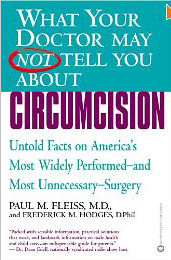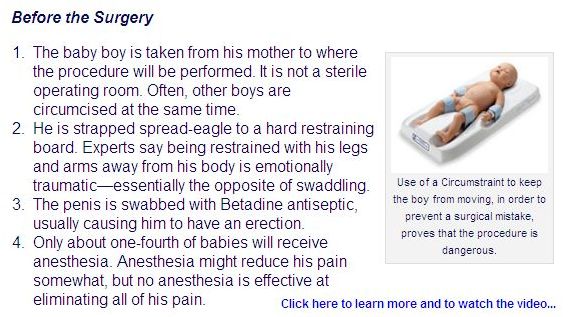Infant Circumcision
 Circumcision is a surgical procedure that involves forcefully separating
the foreskin from the glans and then cutting it off. It is typically accomplished
with a special clamp device. Over a dozen studies confirm the extreme pain of
circumcision. It has been described as “among the most painful [procedures]
performed in neonatal medicine.” In one study, researchers concluded that the
pain was “severe and persistent.” Investigators reported, “This level of pain
would not be tolerated by older patients."
Circumcision is a surgical procedure that involves forcefully separating
the foreskin from the glans and then cutting it off. It is typically accomplished
with a special clamp device. Over a dozen studies confirm the extreme pain of
circumcision. It has been described as “among the most painful [procedures]
performed in neonatal medicine.” In one study, researchers concluded that the
pain was “severe and persistent.” Investigators reported, “This level of pain
would not be tolerated by older patients."
"The baby started shaking his head back and forth, the only part of his body
free to move, as the doctor used another clamp to crush the foreskin lengthwise,
which he then cut. This made the opening of the foreskin large enough to insert
a circumcision instrument, the device used to protect the
glans from being severed during the surgery. The baby began to gasp and
choke, breathless from his shrill continuous screams. How could anyone say circumcision
is painless when the suffering is so obvious? "
"Already, an ever growing number of physicians are opposed to routine neonatal
circumcision. These doctors recognize that no one has the right to forcibly
remove sexual body parts from another individual. They recognize that doctors
should have no role in this painful, unnecessary procedure inflicted on the
newborn." First do no harm..."
March 1, 1999: After a two year investigation, the American Academy of Pediatrics
concluded that the "potential medical benefits" of infant circumcision aren't
significant enough and therefore, they do not recommend it as a routine procedure.
"What I Wish I Had Known"
Marilyn Fayre Milos R.N., Director of NOCIRC
I didn't know what circumcision was when I consented to have my three sons
circumcised. My doctor had told me the surgery was a necessary health measure,
that it didn't hurt, and that it only took a moment to perform... like cutting
the umbilical cord, I thought. I certainly wasn't prepared when, in nursing
school several years later, I saw the surgery for the first time.
 We students filed into the newborn nursery to find a baby strapped spread-eagle
to a plastic board on a counter top across the room. He was struggling against
his restraints—tugging, whimpering, and then crying helplessly. . . I stroked
his little head and spoke softly to him. He began to relax and was momentarily
quiet. The silence was soon broken by a piercing scream—the baby’s reaction
to having his foreskin pinched and crushed as the doctor attached the clamp
to his penis. The shriek intensified when the doctor inserted an instrument
between the foreskin and the glans (head of the penis), tearing the two structures
apart. (They are normally attached to each other during infancy so the foreskin
can protect the sensitive glans from urine and feces.) The baby started shaking
his head back and forth—the only part of his body free to move—as the doctor
used another clamp to crush the foreskin lengthwise, which he then cut. This
made the opening of the foreskin large enough to insert a circumcision instrument,
the device used to protect the glans from being severed during the surgery.
The baby began to gasp and choke, breathless from his shrill continuous screams. How
could anyone say circumcision is painless when the suffering is so obvious?
My bottom lip began to quiver, tears filled my eyes and spilled over. I found
my own sobs difficult to contain. How much longer could this go on? During the
next stage of the surgery, the doctor crushed the foreskin against the circumcision
instrument and then, finally, amputated it. The baby was limp, exhausted, spent."
We students filed into the newborn nursery to find a baby strapped spread-eagle
to a plastic board on a counter top across the room. He was struggling against
his restraints—tugging, whimpering, and then crying helplessly. . . I stroked
his little head and spoke softly to him. He began to relax and was momentarily
quiet. The silence was soon broken by a piercing scream—the baby’s reaction
to having his foreskin pinched and crushed as the doctor attached the clamp
to his penis. The shriek intensified when the doctor inserted an instrument
between the foreskin and the glans (head of the penis), tearing the two structures
apart. (They are normally attached to each other during infancy so the foreskin
can protect the sensitive glans from urine and feces.) The baby started shaking
his head back and forth—the only part of his body free to move—as the doctor
used another clamp to crush the foreskin lengthwise, which he then cut. This
made the opening of the foreskin large enough to insert a circumcision instrument,
the device used to protect the glans from being severed during the surgery.
The baby began to gasp and choke, breathless from his shrill continuous screams. How
could anyone say circumcision is painless when the suffering is so obvious?
My bottom lip began to quiver, tears filled my eyes and spilled over. I found
my own sobs difficult to contain. How much longer could this go on? During the
next stage of the surgery, the doctor crushed the foreskin against the circumcision
instrument and then, finally, amputated it. The baby was limp, exhausted, spent."


Complications of Circumcision
"Williams and Kapila estimate that a realistic rate of complications from neonatal
circumcision ranges from 2% to 10%. To many men who become aware of the function
and value of the prepuce, the fact that this genital sensory organ was amputated
from them at birth is itself a complication of circumcision; in which case,
the actual complication rate is 100%... For males fortunate enough to survive
the surgery without immediate complications, there is a growing awareness among
men of other delayed, long-term consequences of neonatal circumcision, which
are only now beginning to be documented. "
Paul M. Fleiss, MD - "It seems absurd that today we choose
to mutilate a significant percentage of our newborn infants. As a young medical
student in the 1960s, I learned the technique of performing the surgical procedure
of male circumcision. It was not difficult to learn this procedure, and I very
rapidly became expert at removing the foreskin from a newborn. I was able to
do circumcisions in a very short amount of time -- four or five minutes. I did
this at the parents' request, and I was oblivious to the infant's cry.
Several years later into my pediatrics career, after having performed perhaps
a hundred circumcisions, I became aware of the newborn's pain that I had somehow
managed to put out of my consciousness. I now know that every baby that I circumcised
cried and that I never responded to their pain. I then decided I was on their
side; my job was to protect babies, not harm them. It was only then that I began
my study of the foreskin, how it is unlike any tissue found elsewhere in the
human body and accordingly, has special functions. The doctors and others performing
this procedure on newborn babies do not know the pain they are causing nor do
they appreciate the functions of that unique bit of tissue."
"It's about time that this cruel practice was put in its place - in the history
books. I can't believe there's still controversy over circumcision - something so obviously
wrong that it pains me to think that supposedly intelligent people are still
perpetrating this mindless abuse on their own children even as we move forward
into the 21st century. To the religion argument: If God wanted men to be circumcised,
we'd have been born without a foreskin. To the medical argument: If it ain't
broke, don't fix it. When will doctors start practicing what they're taught
- "First, do no harm".
Quite a number of famous child care experts and doctors recommend against circumcision
in their books. Sheila Kitzinger very emphatically recommends that parents leave
their sons intact. Dr. Lendon Smith goes into detail explaining the foreskin’s
purposes and giving all the reasons why circumcision should not be performed.
Dr. Spock, in his most recent book, stated “I feel that there’s no solid medical
evidence at this time to support routine circumcision.” He recommends “leaving
the foreskin the way Nature meant it to be.” Penelope Leach also recommends
against routine circumcision.
Protection from Unwanted Circumcision
There are many reports of boys being circumcised in hospitals in the United
States against their parents' wishes.
Parents should carefully consider the advantages, disadvantages, and risks
of both non-circumcision and circumcision for their son well before the due
date. Parents will be given little time at the hospital to make up their minds
on a complex matter that will affect their son for all of his life.
Many parents believe their child can be protected against the pain of circumcision
through the use of anesthesia, but there is no pain control method that is 100
percent effective. All infants suffer during and after the procedure. There
are risks from anesthesia and there are risks if anesthesia is not used. If
a baby is left intact, he is not subjected to any of these risks.